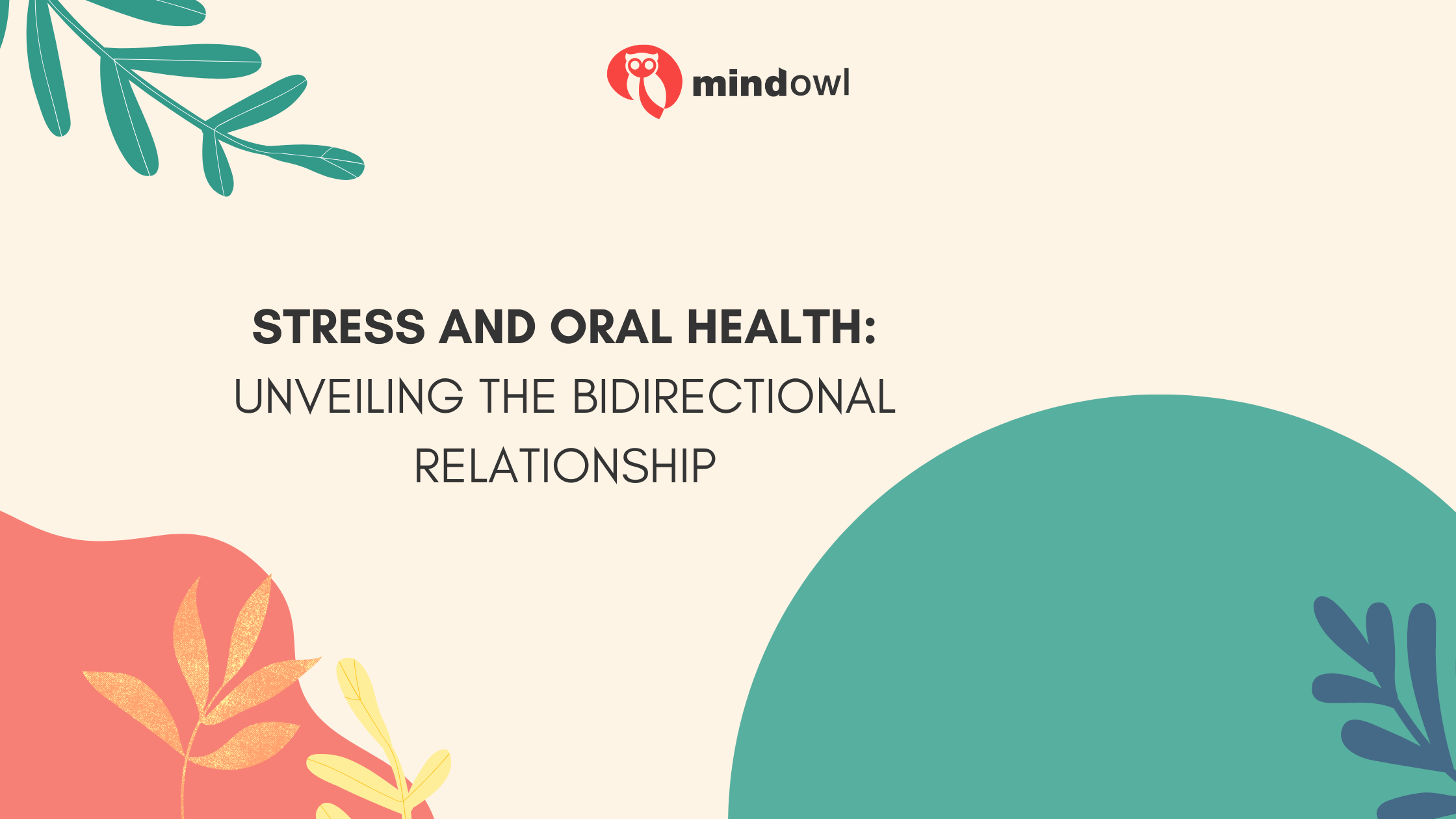Key Takeaways:
- Stress and oral health are interconnected, with stress impacting oral health and vice versa.
- Chronic stress can lead to periodontal disease, bruxism, canker sores, and other oral issues.
- Healthy coping mechanisms, regular dental care, and open communication with healthcare providers are essential for maintaining optimal oral and overall well-being.
Stress, a ubiquitous companion in our modern lives, is a complex physiological response that can significantly impact our overall health and well-being. From cardiovascular and metabolic health to mental and emotional well-being, the pervasive influence of stress is undeniable. However, an often overlooked aspect of this intricate relationship is the impact of stress on oral health.
Recent research has uncovered a fascinating bidirectional connection between stress and oral health. Stress not only impacts our oral health, but dental issues can also increase stress levels. This intricate interplay highlights the importance of understanding and addressing this connection to maintain both a healthy smile and overall well-being.
In this article, we will explore the profound impact of stress on oral health. We will examine the underlying mechanisms behind this connection, shedding light on how stress can manifest in our mouths in various ways.

The Physiology of Stress
When we encounter stressors, our bodies initiate a cascade of physiological responses designed to help us cope. This ‘fight-or-flight’ response involves the release of stress hormones like cortisol and adrenaline. While these hormones can be beneficial in the short term, chronic stress leads to their prolonged elevation, which can have detrimental effects on various bodily systems, including our oral health.
Cortisol, often referred to as the ‘stress hormone,’ plays a crucial role in regulating our body’s energy levels, immune response, and inflammation. However, elevated cortisol levels can suppress the immune system, making us more susceptible to infections and hindering our body’s ability to fight off oral pathogens. This can lead to an increased risk of periodontal disease, oral ulcers, and other oral infections. Additionally, cortisol can contribute to dry mouth by reducing saliva production, further compromising our oral defenses and increasing the risk of tooth decay.
Adrenaline, another stress hormone, can cause blood vessels to constrict, reducing blood flow to the gums and other oral tissues. This decreased blood flow can impair the delivery of oxygen and nutrients, hindering the healing process and making the gums more vulnerable to damage.
The Oral Ecosystem
To fully appreciate the impact of stress on our oral health, we must first understand the significance of the oral cavity and its intricate workings. Our mouths are not merely gateways to sustenance but complex ecosystems teeming with bacteria, both beneficial and harmful. Maintaining a healthy balance within this ecosystem is crucial for overall well-being.
Several key indicators can help us gauge our oral health. These include:
- Healthy gums that are pink, firm, and free from bleeding
- Teeth free from cavities and decay
- Fresh breath
- The absence of pain or discomfort
Saliva, often underestimated, plays a pivotal role in maintaining this delicate balance. It acts as a natural cleanser, washing away food particles and neutralizing harmful acids produced by bacteria. According to my dentist in Markham, saliva also contains minerals like calcium and phosphate, which help strengthen tooth enamel and protect against decay.
Moreover, saliva contains antibodies and enzymes that help fight off infections, keeping our mouths healthy and resilient. However, stress can disrupt this delicate balance, as we’ve discussed, by reducing saliva production and compromising our oral defenses.
The Direct Impact of Stress on Oral Health
Stress leaves a distinct mark on our oral health, affecting various aspects of our mouths in direct and often detrimental ways.
Periodontal Disease
Stress weakens our immune defenses, making us more susceptible to infections, including periodontal disease. This insidious gum disease targets the tissues supporting our teeth, leading to gum recession, bone loss, and eventually tooth loss if not managed. The link between stress and periodontal disease is well-established, with stressed individuals facing a heightened risk of developing this condition.
Bruxism
Stress can manifest physically in our mouths through bruxism, the grinding and clenching of teeth. This often unconscious habit can occur both during sleep and wakefulness, wreaking havoc on our oral health. Worn-down enamel, jaw pain, headaches, and even tooth fractures are just some of the consequences of this stress-induced behavior. Moreover, bruxism can exacerbate temporomandibular joint (TMJ) disorders, leading to pain and dysfunction in the jaw joint.
Canker Sores
Stress isn’t just limited to these two major issues. It can trigger or worsen other oral conditions like canker sores, those painful ulcers that can appear on the tongue, cheeks, or gums. While the exact cause of canker sores remains elusive, stress is undoubtedly a significant contributing factor. Additionally, stress-induced dry mouth creates an environment ripe for harmful bacteria, escalating the risk of tooth decay.
Indirect Effects of Stress on Oral Health
Stress doesn’t merely attack our mouths directly; it also has a sneaky way of undermining our oral health through indirect pathways.
Oral Hygiene Takes a Backseat
When stress takes the wheel, our oral hygiene routines often end up in the backseat. Brushing and flossing might seem less important when we’re juggling work deadlines, family responsibilities, or personal challenges. Skipping these essential habits allows plaque to accumulate, paving the way for tooth decay and gum disease.
Stress Eating
Stress can also lead to unhealthy dietary choices. Reaching for sugary snacks and comfort foods might provide temporary relief, but the consequences for our teeth are far from comforting. These sugary treats fuel the growth of harmful bacteria, increasing the risk of cavities and erosion.
Avoiding the Dentist’s Chair
Stress can make us postpone or even avoid regular dental checkups altogether. Anxiety about dental procedures, coupled with the feeling of being overwhelmed, can create a perfect storm for dental neglect. However, delaying these essential visits allows dental problems to fester and worsen over time, making treatment more complex and costly in the long run.

Coping Mechanisms and Oral Health
The way we cope with stress can either exacerbate or mitigate its impact on our oral health.
Unhealthy Coping
When stress overwhelms us, it’s easy to turn to unhealthy coping mechanisms that offer temporary relief but inflict long-term damage on our mouths.
- Smoking and tobacco use: Smoking and using tobacco products not only increases the risk of oral cancer but also contributes to gum disease, tooth discoloration, and bad breath. Nicotine, a vasoconstrictor, restricts blood flow to the gums, hindering their ability to heal and fight off infection.
- Alcohol consumption: Excessive alcohol consumption can lead to dry mouth, making the oral environment more hospitable to harmful bacteria. Additionally, many alcoholic beverages are high in sugar, further increasing the risk of tooth decay.
Healthy Coping
Fortunately, numerous healthy coping strategies not only help manage stress but also promote optimal oral health.
- Regular exercise: Engaging in regular physical activity releases endorphins, natural mood boosters that can help alleviate stress. Exercise also improves blood circulation, which benefits oral tissues and promotes healing. Aim for at least 30 minutes of moderate-intensity exercise most days of the week.
- Relaxation techniques: Practices like yoga, meditation, and deep breathing exercises can activate the body’s relaxation response, counteracting the effects of stress. Even a few minutes of mindful breathing can help reduce anxiety and lower cortisol levels.
- Adequate sleep: Sleep deprivation can exacerbate stress and compromise the immune system, making us more vulnerable to oral infections. Aim for 7-8 hours of quality sleep each night to allow your body to rest and repair.
- Balanced diet: Nourish your body with a balanced diet rich in fruits, vegetables, whole grains, and lean protein. These nutrient-dense foods support oral health by providing essential vitamins and minerals while limiting the intake of sugary and processed foods.
- Social support: Connect with friends, family, or a support group to share your feelings and experiences. Talking about your stress can help you gain perspective and find solutions. If stress becomes overwhelming, seek professional help from a therapist or counselor.
- Mindful eating: Pay attention to your food choices and eating habits. Avoid mindless snacking and opt for healthier alternatives like fruits, vegetables, or nuts. Chew your food slowly and savor each bite, which can help reduce stress and improve digestion.
By adopting healthy coping mechanisms, you can not only manage stress effectively but also safeguard your oral health and overall well-being.
The Role of Healthcare Providers
Dentists and other healthcare providers play a pivotal role in recognizing and addressing the link between stress and oral health.
Open Communication
Building a strong dentist-patient relationship based on trust and open communication is paramount. Patients should feel comfortable discussing their stress levels and any lifestyle factors that may impact their oral health issues. Dentists, in turn, should actively listen to their patients’ concerns, provide education on the stress-oral health connection, and offer personalized guidance on stress management techniques.
Integrating Stress Management into Dental Care
Dental care should not be solely focused on treating existing oral problems. It should also encompass preventive measures and holistic approaches that address the underlying causes of these issues, including stress. Dentists can integrate stress management into their practice in several ways:
- Stress assessment: Incorporating stress assessment tools, such as questionnaires or brief interviews, can help dentists identify patients who may be experiencing high levels of stress. This allows for early intervention and targeted stress management strategies.
- Referral to mental health professionals: If a patient’s stress levels are severe or impacting their overall well-being, dentists can refer them to mental health professionals for further evaluation and treatment. Collaboration between dental and mental health providers can ensure comprehensive care for patients facing stress-related oral health problems.
- Education and resources: Providing patients with educational materials on stress management techniques, such as mindfulness exercises, can empower them to take an active role in their oral and overall health. Additionally, dentists can offer resources for finding stress management classes or support groups in their community.
Open communication and a proactive approach to stress management can empower patients to take charge of their oral and overall well-being. Together, healthcare providers and patients can break the cycle of stress and oral health problems, ensuring healthier smiles and happier lives.
Final Words
Our mouths are not isolated entities but rather windows into our overall health. By paying attention to the signals our bodies send through our oral health, we can gain valuable insights into our stress levels and take the necessary steps to restore balance and vitality. Good oral health through regular dental care, healthy lifestyle choices, and effective stress management is not just about maintaining a beautiful smile. It’s also about fostering overall well-being and leading a life less burdened by stress.
MindOwl Founder – My own struggles in life have led me to this path of understanding the human condition. I graduated with a bachelor’s degree in philosophy before completing a master’s degree in psychology at Regent’s University London. I then completed a postgraduate diploma in philosophical counselling before being trained in ACT (Acceptance and commitment therapy).
I’ve spent the last eight years studying the encounter of meditative practices with modern psychology.

